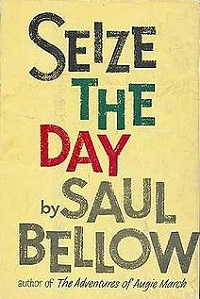Discuss critically the theme of victimization in ‘Seize the Day’.
Or,
Discuss ‘Seize the Day’ by Saul Bellow as an Ethnic Novel.
 Answer: Seize the day is a reflection of the times in which it was written. The novel was written in a post-war world. WWII created several factors that serve backdrop to Wilhelm’s isolation, frustration and anxiety and that represent the feeling of many during the period.
Answer: Seize the day is a reflection of the times in which it was written. The novel was written in a post-war world. WWII created several factors that serve backdrop to Wilhelm’s isolation, frustration and anxiety and that represent the feeling of many during the period.
First and foremost, war creates disorder everywhere and in many cases dislocation because of forced immigration. During the war many people, Jews especially, were escaping the Germans and, thus, fleeing, when they could. This dislocation results in alienation, materialism, frustration and anxiety.
Tommy is an idealist surrounded by the pressures of the outside world. He is isolated and, thus, is forced to turn inward. The urban landscape is the symbol that furthers his isolation, for he is always “alone in a crowd”. Tommy feels cut off not only from his father and from the rest of his family-his sister, his dead mother, his estranged wife and their two sons-but he also feels alienated from himself and from everyone he meets. Tommy Wilham is shown in desperate loneliness and life annihilating alienation and he is in dire need of an understanding heart. This isolation and inner struggle is the predicament of modernity. Dr. Adler, a symbol of professional success, is reluctant to play any part that may bring consolation and comfort to Tommy’s heart. In respect of emotion and feelings, father and son is ocean apart.
In urban circumstances the rites of love or communion are enormously difficult. In the urban world of New York Tommy is considered to talk to him because there is no one else to talk to among the millions of a city like New York. There every other man speaks a language entirely his own and is an end in himself. Looking outside of himself and his small circle, Wilhelm feels alienated from humanity, as represented by New York City and its inhabitants. He feels that communication with others is as difficult as learning another language. Every other man spoke a language entirely his own. You had to translate and translate, explain and explain, back and forth, and it was the punishment of hell itself not to understand or be understood. Wilhelm has an encompassing sense that the alienation he feels is not unique to him, but that “everybody is outcast,” .Tommy’s experience of loneliness is a part of the human condition in a post war society.
The materialistic mentality dominates the modern city. Dr. Adler and Mr. Perls are materialistic and appear to worship money. It is a post-war, post-depression, cold war, technological world. Adler believes in power and “success” and in rationalism. He is the “self-made man.” In fact, Bellow has given Adler the name of a psychiatrist whose teachings were based on ideas of “power.” Everywhere he goes he encounters the materialistic spirit. The old, shriveled, men he meets in the brokerage office have dedicated their lives to making money on the commodities market. But Wilhelm senses something inimical to life in the way the secretive, uncommunicative Mr. Rappaport has made his money, in the “chicken business.” He imagines the appalling conditions in which the animals live on chicken farms. Then, when he notices that Rappaport will not let anyone see what he has written on his notepad, he thinks, “This was the way a man who had grown rich by the murder of millions of animals, little chickens, would act.”
In materially prosperous city of New York frustration prevails and there is hardly any peace or rest. Tommy’s mind heaves under the pressure and weight of the modern city and innumerable problems of the modern age. Here everyone takes pills for the cherished touch of natural sleep and in Dr. Adler’s word- “God knows! These things (pills) get to be as serious as poisons, and yet everyone put all their faith in them.” In depicting anxiety as part of the human condition, Bellow has again and unerringly seizes the prevailing mood of the society. Bellow’s hero beset by anxiety and exhibits all the symptoms associated with it, like constriction of the chest, a lump in the throat, increase in heart beat etc. All these are the direct outcome of anxiety that modern city dwellers undergo.
Treachery and oppression control modern society. The mysterious Dr. Tamkin tricks Tommy Wilhelm into giving him his last seven hundred dollars to invest. He assures Tommy that this investment will make him wealthy. But Tommy is painfully deceived by him.
Tommy’s vindictive wife Margaret extremely hostile to Tommy Wilhelm, tries her best to victimize him and ruin him both financially and emotionally for her self-interest. She capitalizes every opportunity to oppress Tommy. In his miserable state, Margarate appears to Tommy as a symbol of oppression, only to add to his predicament.
Bellow as a modern master touch up the subject of modern man’s misery.
Bellow’s themes namely alienation, hard world of money, anxiety, deception and selfishness not only depict the American life but also the complexity of modern society. Saul Bellow generalizes his theme. So from this point of view we can say that Seize the day is an ethnic rather than an American novel.




